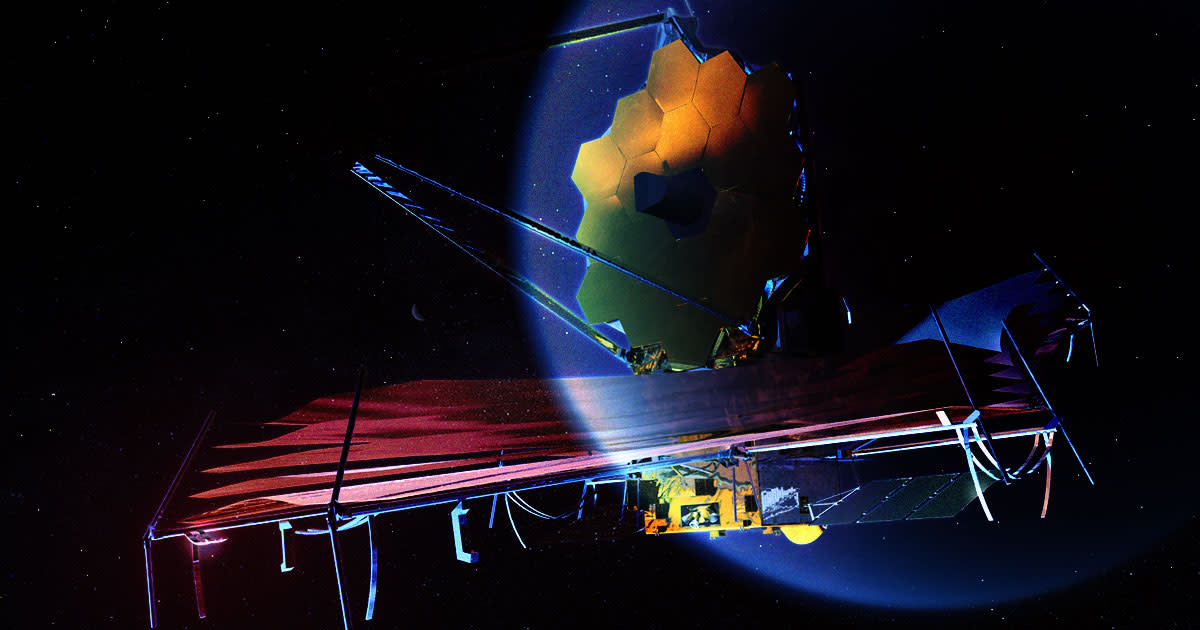Experts Push Back Against Rumors of James Webb Life Detection

Earlier this month, British news magazine The Spectator published a piece with the eyebrow-raising title "Have We Just Discovered Aliens?" making the case that we may be about to get "strong evidence" of a biosignature on a distant exoplanet.
Perhaps the grabbiest quote was from UK astronaut Tim Peake, who speculated that NASA's James Webb telescope had already found evidence of alien life and "they don’t want to release or confirm those results until they can be entirely sure."
The piece also quoted UK astrophysicist Becky Smethurst, who predicted in a YouTube video late last year that "we are going to get a paper that claims to have strong evidence for a biosignature in an exoplanet’s atmosphere very, very soon."
As we wrote yesterday, it's true that the James Webb has started to make some extremely interesting observations — more on that in a moment — that are of great interest to astrobiologists. But as always, there's reason for skepticism about these outsize claims.
Case in point, the experts quoted by the British magazine have also started to speak up, throwing cold water on the whole thing.
"So turns out something I said in a YouTube video has been jumped on by UFO enthusiasts and then bizarrely The Spectator," Smethurst tweeted.
"I said that in 2024 we could see a claim of a biosignature found in the atmosphere of an exoplanet with JWST," she added. "This was just an enthusiastic and hopeful guess."
"The leap from 'potential biosignature' to full on 'aliens' is ridiculous," Smethurst added in a followup. "By biosignature, we're talking tiny molecule in atmosphere of an exoplanet that's big enough that JWST can even do this. Not aliens on a rocky planet."
Astrophysicist Jonathan O'Callaghan chimed in to agree that The Spectator's claims were "unlikely for a number of reasons."
"JWST isn't looking at any rocky planet in detail enough to be able to find biosignatures," he tweeted. "The only such planets we have begun to investigate in this way are the TRAPPIST-1 red dwarf planets, but only the innermost planets — which have little to no atmosphere."
There's also a basic issue of subject matter expertise: the three quoted experts in the Spectator article are an astronaut, an astrophysicist, and a mechanical engineer. None are astrobiologists or have any particular expertise in the search for life beyond Earth.
"And I'd gently point out that none of the three people quoted — two of whom are close colleagues — would claim to be experts in atmospheres, or astrobiology," Oxford astronomer and author Chris Lintott tweeted.
That's not to say that the James Webb hasn't already yielded data that could, if the research bears it out, indeed suggest an actual alien biosignature. The most prominent are observations from late last year of a "hycean" ocean planet dubbed K2-18b, some 120 light-years from Earth and located in the "habitable zone" of its star. In them, the observatory found evidence of dimethyl sulfide — which here on Earth, is only produced by living organisms — in the planet's atmosphere.
On its face, that's incredibly exciting. Sure, maybe there's something wrong with the data, or the way scientists are interpreting it, or maybe there's a way that dimethyl sulfide can arise without life. But that's the way science works: researchers find something interesting, and then they and their peers dig deeper to figure out what it really means. Many initially exciting findings are dead ends, but others aren't — and at the end of the day, it would be very cool to find compelling evidence that we aren't alone in the universe.
Until then, though, NASA's message is to keep your hat on.
"It is anticipated that JWST observations may lead to the initial identification of potential biosignatures that could make habitability more or less likely for a given exoplanet," James Webb's deputy project scientist for exoplanet science Knicole Colón told Ars Technica of the Spectator's claims. "Future missions will be needed to conclusively establish the habitability of an exoplanet."
And in the process, let's not take any experts' comments out of context.
"The storm that's been whipped up is because 3 sci-commers have been asked 'what exciting things are happening in 2024' and we all wanted to give an exciting answer," Smethurst tweeted.
"I can't speak for Maggie or Tim Peake, but as far as I know, there's no detection," she added. "There's no paper I've seen."
More on the kerfuffle: Rumors Circulating That James Webb Has Discovered Life on Another Planet

 Yahoo News
Yahoo News 
